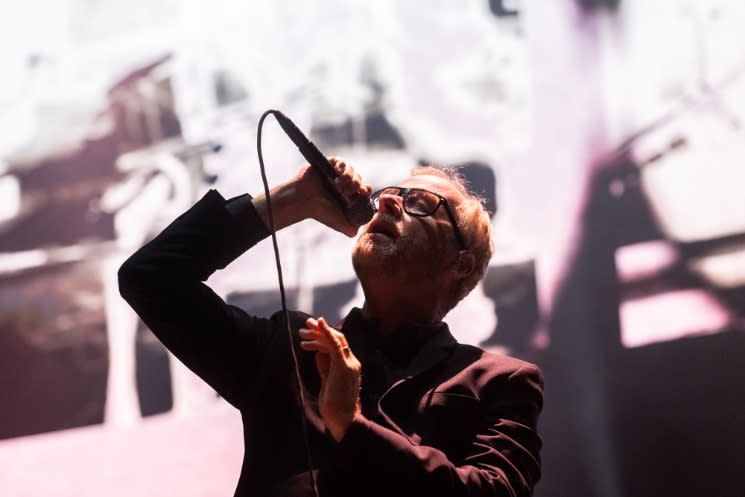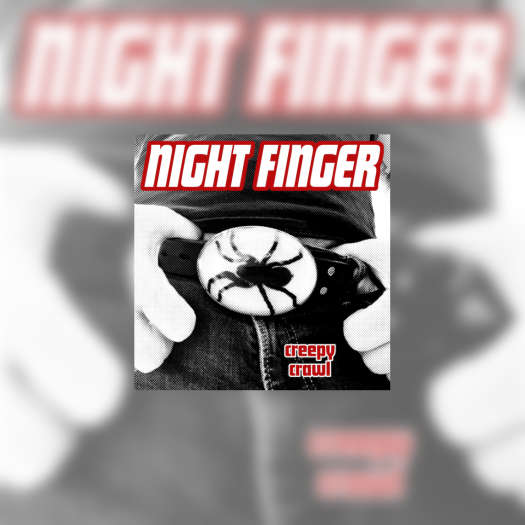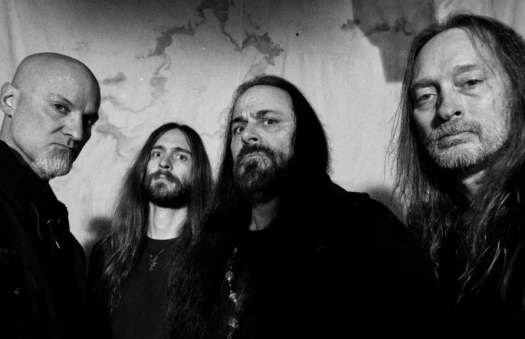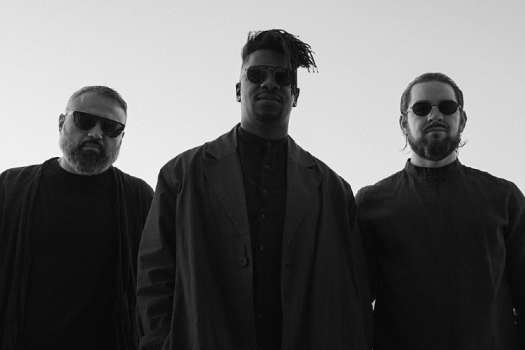"I wanna say hi to my kids, who are just over there," U.S. Girls' Meg Remy said, pointing to her twins after opening her Budweiser Stage set last night (August 20) with a sweeping, billowy rendition of 2015's "Navy & Cream." "Can you see me on the big screen? Mama's huge."
Mama was indeed huge, her image towering over the still-sparse crowd as she and her band ran through a set that split the difference between the elastic funk and soul of this year's Bless This Mess and older favourites like "4 American Dollars" and "L-Over."
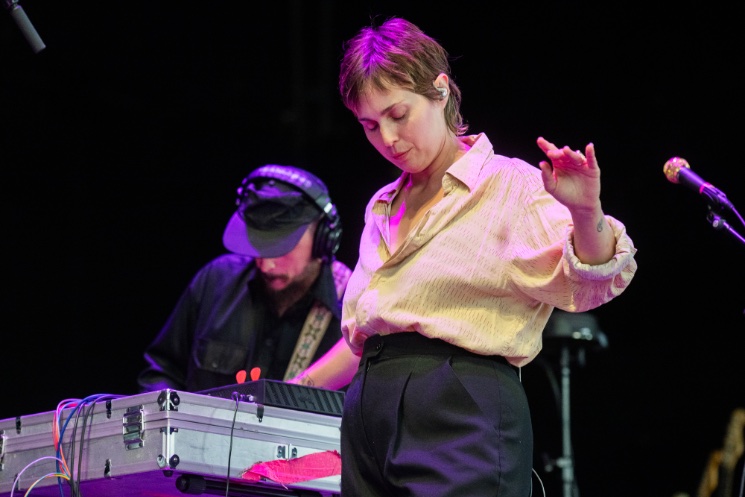
The performance was as committed and electrifying as you'd expect from U.S. Girls, though the still-settling crowd — pizza slices, beers and National merch in hand — seemed only half-present for Remy's blade-like intensity and winking sensuality. It was clear for whom this crowd had gathered, and the anticipation somewhat clouded the low-key majesty of Remy and co.'s opening slot.
It was when Patti Smith emerged — greeted by a standing ovation as she sauntered to the mic, grey hair swinging — that the audience locked in. It's hard to describe exactly what it feels like to watch Smith perform in 2023; a bittersweet nostalgia for something you don't fully understand, an awe at her incandescence and fury, a joy that threatens to tip into tears as she barks and warbles. Backed by enormous black-and-white portraits — of Allen Ginsberg, Tom Verlaine, Neil Young, Fred "Sonic" Smith, and, regrettably, Johnny Depp — Smith's performance had the air of a tribute act, tying long threads of personal history to her mic stand.
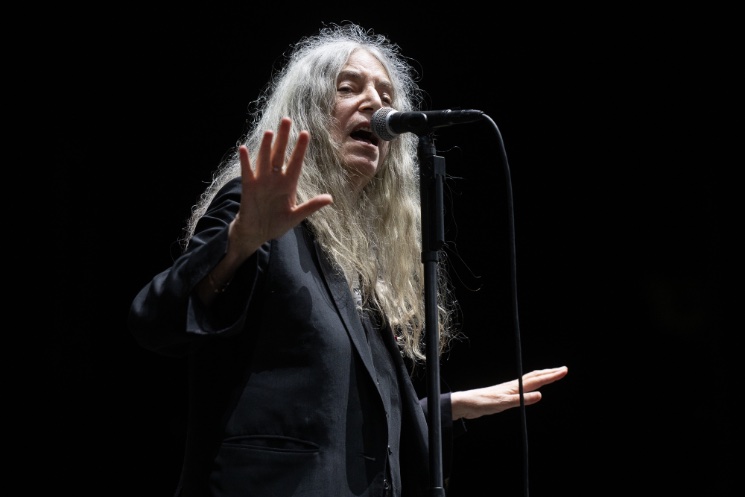
After opening the show with 1988's "People Have the Power," Smith read Ginsberg's "Footnote to Howl," her rich, bruising voice dropping into each "Holy" like a stone through water. The rest of the show followed this wandering muse, mixing covers and tributes (to Verlaine in Television's "Guiding Light," to Fred in "Because the Night") with songs like "Dancing Barefoot," "Beneath the Southern Cross" and "Nine."
Smith's famously dichotomous core — her bashful quiet and her universe-destabilizing enormity — was cracked open as ever, with modest thank yous to the crowd, the National and her lost friends slipped in beside throat-tearing demands to raise your arms and "feel your fucking freedom!" Smith's revolutionary bent hasn't straightened in the 50 years since "Piss Factory," though the fight feels more desperate, perhaps less possible, as fires rage across the globe and hell opens beneath us. Still, it was easy to be swept into her righteous fury, to pump your arms as she called for release from corporations and governments and fear — and easier still to be pulled into her heartache, as when her voice broke ever-so-slightly during a prayerful cover of Neil Young's "After the Gold Rush," throat catching as she sang "Look at Mother Nature on the run / In the 21st Century."
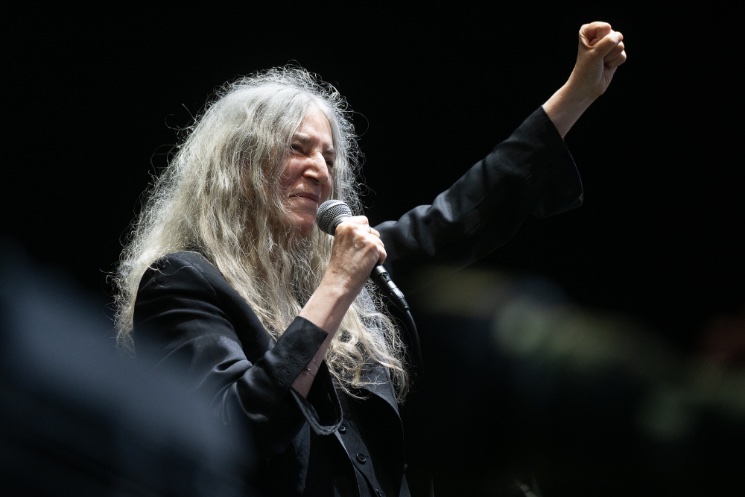
That solemnity was stripped away by Smith's closing twofer, carving all that complicated pain into the arrows of "Pissing in a River" and "Gloria." The former swelled and retracted in great pitch-black waves, raising the stakes of heartbreak to world-swallowing proportions, while the latter brought the crowd to their feet once again, Smith — voice a little deeper, hair a little longer — sounding as vital and alive as she did singing that avalanche of sound in 1975. By the time it was over, it felt like your brain had been flattened and re-inflated, your heart a bit battered. It took a minute or two to remember that Smith was technically an opening act; the show wasn't over.
Despite the presence of Patti Fucking Smith, it was clear that to many in the crowd (including those who somehow decided to arrive only after she'd left the stage), the National were the night's major draw. To be fair, they committed to their headliner status, delivering light and smoke and stadium-filling majesty with a stoic ease. Multi-instrumentalist (and producer to the stars) Aaron Dessner was the de-facto voice of the band, seemingly more engaged — or at least more comfortable with — the band's status as big-tent crowd annihilators, leading the audience in a rapid clap-along to "Don't Swallow the Cap" as singer Matt Berninger stalked the shadows. Berninger's stage presence is magnetizing and removed — a tall, dark and bespectacled frontman who gives each song his undivided energy before retreating into the deep red lights that swept across the stage like air raid beacons.
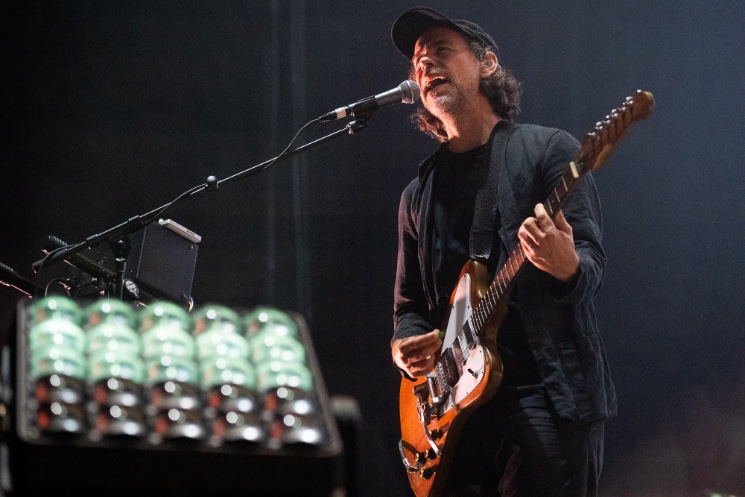
"We'll be playing new stuff, old stuff and unreleased stuff," Dessner said after the band opened with "Once Upon a Poolside," and they did just that — running through new tracks like "Tropic Morning News," "New Order T-Shirt" and "Grease in Your Hair" alongside classics like "Bloodbuzz Ohio," "I Need My Girl," "Apartment Story" and "Graceless." The set was dynamic and precise and cool and perfectly maudlin, another powerhouse performance from a band that's mastered the art of powerhouse performance. The enormity of their energy was reciprocated by a crowd who swung their bodies and leapt from their seats with a fever, hands clinging to shoulders and toothy grins exchanged whenever a formative favourite began revving its familiar engine.
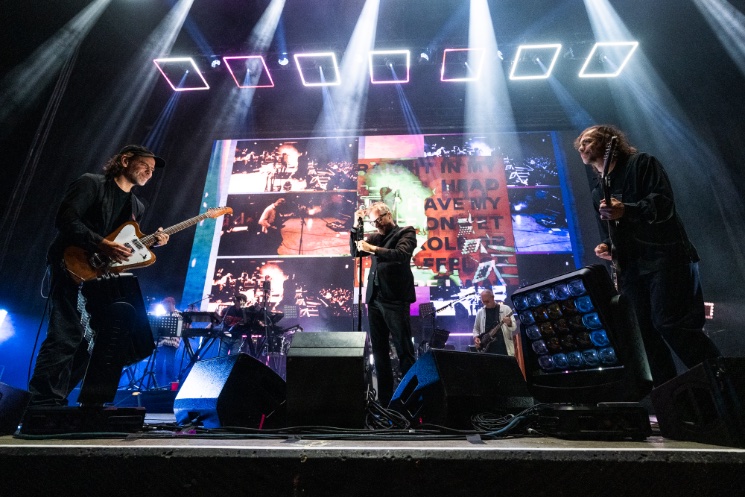
Following the relative modesty of U.S. Girls' and Patti Smith's sets, the calibrated bombast felt eyebrow-singing, burning off the smallness of what came before in searing waves of lithe showmanship. Returning for a five-song encore that ended with the solemn sweep of "Vanderlyle Crybaby Geeks," the National re-established their already secured spot as one of our most impressive live bands — if they couldn't quite pierce the heart with the same clarifying precision as what came before, it's a testament to their taste that they put themselves in such good company.
Mama was indeed huge, her image towering over the still-sparse crowd as she and her band ran through a set that split the difference between the elastic funk and soul of this year's Bless This Mess and older favourites like "4 American Dollars" and "L-Over."

The performance was as committed and electrifying as you'd expect from U.S. Girls, though the still-settling crowd — pizza slices, beers and National merch in hand — seemed only half-present for Remy's blade-like intensity and winking sensuality. It was clear for whom this crowd had gathered, and the anticipation somewhat clouded the low-key majesty of Remy and co.'s opening slot.
It was when Patti Smith emerged — greeted by a standing ovation as she sauntered to the mic, grey hair swinging — that the audience locked in. It's hard to describe exactly what it feels like to watch Smith perform in 2023; a bittersweet nostalgia for something you don't fully understand, an awe at her incandescence and fury, a joy that threatens to tip into tears as she barks and warbles. Backed by enormous black-and-white portraits — of Allen Ginsberg, Tom Verlaine, Neil Young, Fred "Sonic" Smith, and, regrettably, Johnny Depp — Smith's performance had the air of a tribute act, tying long threads of personal history to her mic stand.

After opening the show with 1988's "People Have the Power," Smith read Ginsberg's "Footnote to Howl," her rich, bruising voice dropping into each "Holy" like a stone through water. The rest of the show followed this wandering muse, mixing covers and tributes (to Verlaine in Television's "Guiding Light," to Fred in "Because the Night") with songs like "Dancing Barefoot," "Beneath the Southern Cross" and "Nine."
Smith's famously dichotomous core — her bashful quiet and her universe-destabilizing enormity — was cracked open as ever, with modest thank yous to the crowd, the National and her lost friends slipped in beside throat-tearing demands to raise your arms and "feel your fucking freedom!" Smith's revolutionary bent hasn't straightened in the 50 years since "Piss Factory," though the fight feels more desperate, perhaps less possible, as fires rage across the globe and hell opens beneath us. Still, it was easy to be swept into her righteous fury, to pump your arms as she called for release from corporations and governments and fear — and easier still to be pulled into her heartache, as when her voice broke ever-so-slightly during a prayerful cover of Neil Young's "After the Gold Rush," throat catching as she sang "Look at Mother Nature on the run / In the 21st Century."

That solemnity was stripped away by Smith's closing twofer, carving all that complicated pain into the arrows of "Pissing in a River" and "Gloria." The former swelled and retracted in great pitch-black waves, raising the stakes of heartbreak to world-swallowing proportions, while the latter brought the crowd to their feet once again, Smith — voice a little deeper, hair a little longer — sounding as vital and alive as she did singing that avalanche of sound in 1975. By the time it was over, it felt like your brain had been flattened and re-inflated, your heart a bit battered. It took a minute or two to remember that Smith was technically an opening act; the show wasn't over.
Despite the presence of Patti Fucking Smith, it was clear that to many in the crowd (including those who somehow decided to arrive only after she'd left the stage), the National were the night's major draw. To be fair, they committed to their headliner status, delivering light and smoke and stadium-filling majesty with a stoic ease. Multi-instrumentalist (and producer to the stars) Aaron Dessner was the de-facto voice of the band, seemingly more engaged — or at least more comfortable with — the band's status as big-tent crowd annihilators, leading the audience in a rapid clap-along to "Don't Swallow the Cap" as singer Matt Berninger stalked the shadows. Berninger's stage presence is magnetizing and removed — a tall, dark and bespectacled frontman who gives each song his undivided energy before retreating into the deep red lights that swept across the stage like air raid beacons.

"We'll be playing new stuff, old stuff and unreleased stuff," Dessner said after the band opened with "Once Upon a Poolside," and they did just that — running through new tracks like "Tropic Morning News," "New Order T-Shirt" and "Grease in Your Hair" alongside classics like "Bloodbuzz Ohio," "I Need My Girl," "Apartment Story" and "Graceless." The set was dynamic and precise and cool and perfectly maudlin, another powerhouse performance from a band that's mastered the art of powerhouse performance. The enormity of their energy was reciprocated by a crowd who swung their bodies and leapt from their seats with a fever, hands clinging to shoulders and toothy grins exchanged whenever a formative favourite began revving its familiar engine.

Following the relative modesty of U.S. Girls' and Patti Smith's sets, the calibrated bombast felt eyebrow-singing, burning off the smallness of what came before in searing waves of lithe showmanship. Returning for a five-song encore that ended with the solemn sweep of "Vanderlyle Crybaby Geeks," the National re-established their already secured spot as one of our most impressive live bands — if they couldn't quite pierce the heart with the same clarifying precision as what came before, it's a testament to their taste that they put themselves in such good company.
